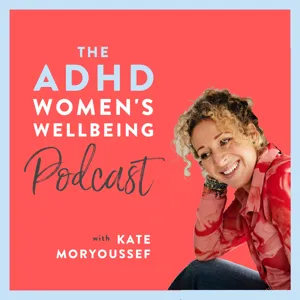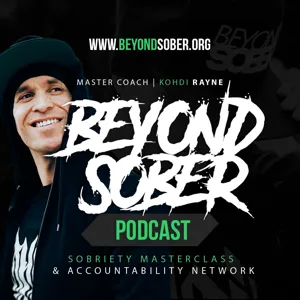Podcast Summary
Emotional regulation is a common challenge for women with ADHD: Women with ADHD often face emotional regulation issues, including anger, frustration, impatience, intolerance, and underlying tension. Seek support and tools to manage these emotions effectively.
Emotional regulation is a significant challenge for many women with ADHD. Kate Moore Yousef, the host of the ADHD Women's Well-being podcast, emphasizes this point based on her experience coaching hundreds of women with ADHD. Emotional regulation issues can manifest as easy anger, frustration, impatience, intolerance, and a feeling of underlying tension. Maintaining calm and harmony can be an uphill struggle for individuals with ADHD, and it's essential to recognize that these feelings are not a reflection of one's character or flaws. Emotional regulation is a common experience for women with ADHD, and it's essential to seek support and tools to manage these emotions effectively. Kate offers compassion and insight into emotional regulation, encouraging listeners to view it as a normal part of the ADHD experience rather than a personal failing. She also mentions a project to help with emotional regulation, which may be of interest to listeners.
Private podcast for emotional regulation: A private podcast, Karma Days, offers accessible audio content on emotional regulation to help individuals manage reactions and maintain inner calm.
Our brains are wired for heightened reactivity, and emotional regulation can be a challenge, especially for parents dealing with children's tantrums or other sources of stress. To help address this, I've created a solution called Karma Days, a private podcast offering easily digestible, accessible audio content on emotional regulation. The private podcast format allows listeners to pick and choose episodes based on their needs and schedule, making it a valuable tool for managing emotional responses in various situations. By providing a range of guidance, advice, and tips, Karma Days aims to support individuals in maintaining inner calm and equilibrium, even when external circumstances may be chaotic.
Exploring personal growth with Karma Days: Karma Days offers tools and insights for self-awareness, self-acceptance, and personal growth. It encourages acknowledging emotions, recognizing patterns, setting boundaries, and changing thought patterns for a more authentic, joyful, and fulfilling life.
Key takeaway from the discussion about Karma Days is that it aims to provide insights and tools for self-awareness, self-acceptance, and personal growth. The program encourages acknowledging and releasing suppressed emotions, recognizing patterns of people-pleasing and stifled creativity, and setting boundaries to prioritize personal needs. By challenging these areas, individuals can make small steps towards living more authentic and fulfilling lives, filled with joy, connection, and self-commitment. Additionally, the program focuses on recognizing and changing thought patterns to foster positivity, compassion, forgiveness, and self-acceptance. Overall, Karma Days offers a holistic approach to personal development, helping individuals make incremental shifts towards a more balanced and fulfilling life.
Morning routines impact daily life, create balance: Mindful mornings can lead to calmer days, weeks, and years by recognizing energy drains, practicing self-compassion, and connecting with our nervous system.
Our morning routines significantly impact our daily lives, and by making intentional choices and allowing small shifts, we can experience calmer days, weeks, and even years. This can involve recognizing where we're giving away our energy and not receiving enough, such as neglecting movement or fresh air, and understanding the connection between our nervous system and emotional wellbeing. By gifting ourselves moments for reflection and self-compassion, we can tap into our parasympathetic nervous system and make decisions that lead to a more balanced life. This can positively impact various areas of our lives, including parenting, careers, and relationships. The goal is to create a resource, like "Calmer Days," that allows individuals to dip in and out as needed, providing guidance and self-empowerment.
Recognizing and fulfilling personal needs for emotional well-being: Acknowledging our needs for fulfillment, validation, and quiet reflection can improve overall well-being and help regulate our brains. Prioritize self-care to maintain mental and emotional health.
Our internal emotions and moods are significantly influenced by factors within our subconscious mind, and fulfilling our personal needs and living authentically can help regulate our brains and improve our overall well-being. It's essential to acknowledge if we are being fulfilled, seen, listened to, and validated in our daily lives. Neglecting important activities or passions can lead to frustration and resentment. Creating a sacred space, whether at home or elsewhere, is crucial for obtaining quietness and reflection, allowing us to think and recharge. As women, juggling various responsibilities, it's essential to prioritize our mental and emotional health by recognizing our needs and making time for self-care.
Practicing optimism and resilience during difficult times: Even during hardships, we can learn to be optimistic and resilient, discovering inner strengths and connections, and finding comfort in faith or trust in something greater.
Even during difficult and frustrating times, it's essential to practice optimism and resilience. These skills may not come naturally, but they can be learned. Through experiences of tragedy and trauma, people often discover inner strengths and connections that help them get through challenging times. Having faith or trust in something greater can also provide comfort and help during darker days. It's important to remain open to new ideas and not give up hope, even when it feels hard. Practicing affirmations, focusing on finding the good in situations, and trusting that resources will be available can all help in maintaining a positive mindset. Ultimately, having faith or trust in something beyond ourselves can provide a sense of purpose and help us get through life's challenges.
Building inner strength and resilience through challenges: Seek resources, practice creativity, stay grounded in nature, and maintain meaningful connections to build inner strength and resilience
Facing challenges in life, whether with or without ADHD, can be an opportunity to build inner strength and resilience. Trusting in the availability of resources and seeking them out, practicing creativity, and staying grounded through nature are effective ways to cope. Additionally, maintaining meaningful connections with understanding people is crucial for avoiding exhaustion from masking symptoms. Remember, creativity doesn't always mean grand artistic projects; it can be as simple as labeling jars or enjoying a daily cooking routine. And for those with ADHD, ensuring a daily dose of nature and connection is especially vital.
Embrace self-care and stillness: Prioritize meaningful connections, quiet reflection, and self-care to accept ourselves, trust inner wisdom, and recharge in a hyper-connected world. Rest and relaxation are essential components of a balanced life, not signs of weakness.
It's essential to prioritize self-care, including having meaningful connections with others and taking time for quiet reflection. These practices help us accept ourselves, trust our inner wisdom, and recharge in a hyper-connected world. It's important to remember that rest and relaxation are not signs of weakness but necessary components of a balanced and productive life. Embrace the power of stillness and self-awareness, and don't shy away from taking a day off or seeking solitude when needed. As we grow older, we may find it easier to give ourselves permission to rest and prioritize our well-being, but it's crucial to start these habits early. Remember, knowledge and awareness are powerful tools, especially for individuals with ADHD. Connect with like-minded individuals in the ADHD Women's Well-Being Pod community, and consider sharing this episode with those who might benefit from the conversation. Lastly, if this episode resonated with you, please leave a review to help spread the word and enable more people to discover these valuable conversations.




